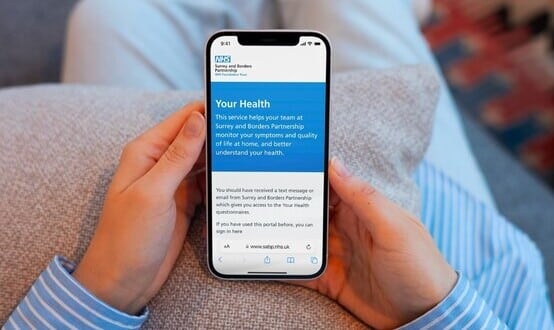Dr Google ‘diagnoses’ 100m health concerns as GP wait times rise

Packed GP surgeries and rising wait times is driving more people to Google to self-diagnose health concerns, new research has suggested.
Data compiled by private UK healthcare provider, Benenden Health, revealed that more than 100 million health-related Google searches were placed in the UK in the past 12 months.
It links this to an increase in GP wait times, based on a OnePoll survey in February in which 25% of 2,000 UK adults said they were on a waiting list for a doctor’s appointment.
Benenden Health analysed more than 8,000 unique health related phrases and questions around the most common ailments and diseases, obtained using Google Keyword Planner.
The data indicated that mental health was the biggest concern amongst the UK public: anxiety, schizophrenia, chronic depression and bipolar disorder all featured in the top 10 most Googled health concerns, making up one quarter of all searches.
Sexual health-related searches were the second most common.
The data also revealed that self-diagnosis was highest in London, representing nearly a quarter (23%) of all search enquiries.
Benenden Health said its finding were supported by a rise in cases of “cyberchondria” – a state of medical anxiety caused by online symptoms checking and self-diagnosis, which can lead to unnecessary GP appointments at the cost to the NHS.
Cheryl Lythgoe, matron at Benenden Health, said: “It is of little surprise to see mental and sexual health questions leading the way as common searches for health concerns.
“If people wish to use Google for health information or reassurance, we would highly recommend the use of NHS validated websites and to consult directly with a health professional to reach a diagnosis”
For its research, up to 400 unique search queries related to 27 of the UK’s most common health problems were analysed, with topics split into seven categories.
From these, the top three most frequently-searched topics were used to gain an insight into the UK public’s biggest health concerns.
Cancer was not included in the final analysis – Benenden Health explained that, due to there being a large variance in different cancerous strains, to have included cancer “would have impacted the results in other categories and not shown a true picture.”
Paging Dr Google
A study published by Private Midwives in April 2018 revealed that search engines were more than likely to provoke anxiety in pregnant mothers during pregnancy than other sources of information.
Research from the journal Health, Risk & Society also indicated a varying level of trust in ‘Dr Google’ amongst women searching for information about breast cancer, with researchers warning that a lot of information available online was poor quality, misleading or difficult to interpret.
The NHS recommends people worried about health concerns use its NHS 111 service.
According to data from NHS Digital in May 2019, the free service, which can be access online or by telephone, has been used more than a million times since being launched in December 2017.
Around 13% of all NHS 111 online journeys are reported to end with self-care advice, while almost half (48%) of triages direct users to contact primary care and 25% end with emergency care.
Related stories:
- Is NHS 111 a waste of time?
- NHS should ‘prescribe FitBits’ to prevent inequality in health tech
- Line ‘needs to be drawn’ to establish accountability in healthcare AI, report warns





3 Comments
How about getting Google to up-rank trusted health content, such as NHS.UK, Patient.info etc so that wonder cure sites etc are not top ranking. I wonder if any NHS England / NHS Digital team has met with Google to tackle this problem in the UK.
@the Insider, I can’t comment on whether the NHS digital team has met with Google.
But last year, there was an algorithm change dubbed as the “Medic update” last year.
Since then reputable medical sites have been eager cite the research sources and make sure that content is reviewed by a medical officer on a regular basis. Otherwise the pages will just fall off Google’s SERPS.
There’s always still the issue of antivax twitter bots and that people will believe what they want to anyway.
medic update source: https://www.google.com/search?q=medic+update&rlz=1C1GCEB_enGB815GB815&oq=medic+update&aqs=chrome..69i57j0l5.2620j0j4&sourceid=chrome&ie=UTF-8
Thank goodness we have Google.
Comments are closed.